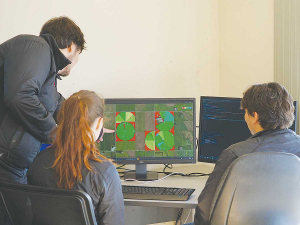$52,500 fine for effluent mismanagement
A Taupiri farming company has been convicted and fined $52,500 in the Hamilton District Court for the unlawful discharge of dairy effluent into the environment.
 Lindsay's New Zealand based software engineers Bradley Carter, Victoria Wassilieff and Curtis Preston working on smart pivot.
Lindsay's New Zealand based software engineers Bradley Carter, Victoria Wassilieff and Curtis Preston working on smart pivot.
New Zealand farmers are having input into the development of a revolutionary irrigation prototype as its Feilding-based software engineers seek to refine its design.
Lindsay, which produces the Zimmatic brand of pivot irrigators, has introduced the concept of the world’s first ‘smart pivot’ to its markets around the globe.
The game-changing irrigation prototype diagnoses its own operating faults and can launch a drone to manage crops at leaf level. It uses machine learning and multiple sensors and cameras to operate.
More than 60 NZ farmers tuned into two recent webinars, where they were shown the smart pivot’s user interface and asked for feedback on its functionality and how it could be improved.
Technology strategy advisor for Zimmatic Stu Bradbury says farmer involvement into the development process is crucial.
“The smart pivot is the ultimate example of Lindsay’s commitment to customer-led innovation. It is the culmination of more than a decade of listening to all the things farmers wished their pivot could do.
“The two webinars were an extension of this process and an opportunity for us to use modern day technology to connect with as many farmers as possible, and help us refine the smart pivot’s design.”
Lindsay’s New Zealand team, based in Feilding, developed the software for the prototype that builds on the existing FieldNET platform.
The smart pivot combines high resolution aerial and satellite imagery, along with cameras and sensors, to detect crop growth stages, optimise irrigation and detect disease. The system can even launch a drone to capture in detail any crop anomalies, using thermal imaging to detect the issue and offer a solution.
The system will let you know if a tyre is going flat before it happens, or if a gearbox is showing signs of wear. It can also detect ponding, blocked sprinklers or sprinklers that are not working properly.
You can even programme it to notify a dealer to send out a service technician.
“Farmers who tuned into the webinars were keen to see how much the smart pivot could potentially do for them, saving them both the time and energy when it comes to best-managing their pivots,” says Bradbury.
“There was particular interest in the smart pivot’s ability to send automated alerts when it was not running efficiently or outside of the recommended operating parameters. Farmers also wanted to learn more about how its technology could translate into better environmental compliance.
“We know farmers are conscious of both their business and environmental efficiency, and recognise the two are innately intertwined.
“The smart pivot can help them see how individual management decisions made throughout the season have impacted the efficiency of their operation.
“It can also help them understand their input costs, like water use, and how that relates to yield profitability.”
Bradbury says work on the smart pivot’s design is on-going and it will be some time before farmers can get their hands on this revolutionary new piece of ‘kit’.
“We are excited about the appetite there is from farmers this type of technology, but we need to make sure we get it right.
“This concept is still very much in a development phase and there is a lot more refinement and testing we need to do before we can launch it to market.
“We recognise the value farmers can add so we will continue to consult with them and keep and keep them updated on our progress.”
Fonterra shareholders say they will be keeping an eye on their co-operative's performance after the sale of its consumer businesses.
T&G Global says its 2025 New Zealand apple season has delivered higher returns for growers, reflecting strong global consumer demand and pricing across its Envy and Jazz apple brands.
New Zealand's primary sector is set to reach a record $62 billion in food and fibre exports next year.
A new levying body, currently with the working title of NZWool, has been proposed to secure the future of New Zealand's strong wool sector.
The most talked about, economically transformational pieces of legislation in a generation have finally begun their journey into the statute books.
Effective from 1 January 2026, there will be three new grower directors on the board of the Foundation for Arable Research (FAR).